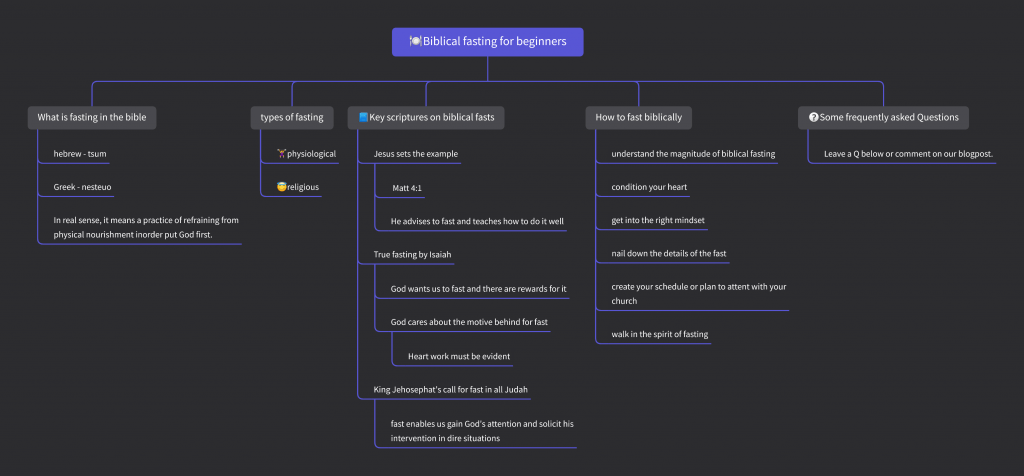Many people grew up practicing biblical fasting. Whether or not they knew the significance of it, they did it. And for these select ones, it became rote.
My case is different. Though my parents are Christians, I didn’t need to observe a biblical fast until I was an adult. A young adult in a dark place.
Looking back, I realize that a person doesn’t have to be a spiritual guru to reap the rewards of a biblical fast. Anyone can. It’s a provision made by Grace and you can reap it too.
New to the concept or practice of biblical fasting? This article provides information on what fasting is in the bible, other types of fasting, and how to get started.
Side note. Children under the age of 14, pregnant women, elders of 60 years and above, and people physically and mentally unable to fast are advised not to.
What is fasting in the bible?
The word fast translates into Hebrew as ‘tsum‘ which means to abstain from food.
The word itself was first cited in the book of Judges 20:26. But the practice of biblical fasting was first done by Moses in Exodus 24 and documented 40 years later in Deuteronomy 9:9-19.
The Greek translation is ‘nesteuo‘ which means to abstain as, a religious exercise, from food and drink: either entirely, if the fast lasts for a single day, or from customary and choice nourishment if it continued for several days.
Food and drink are only examples of things that satisfy fleshy demands. Basically, one can fast from anything inorder to draw closer to God. These things don’t always necessarily have to be bad things.
Biblical fasting can be viewed as a practice of subjugating the desires of the flesh and abstaining from physical nourishment in order to seek the face of God.
True fasts are important practices that depict respect for God and His desires.
This is the true intent of the spiritual practice of a biblical fast.
In a religious sense, it also entails rendering a sort of penance as atonement for sin.

Types of fasting
Fasting is a practice that involves the reduction of food intake by a person. This concept is embodied in several types of fasts which can be grouped broadly into Physiological and Religious fasts. The different types of fasting are ;
- Preoperative fasts: This type of fast is required to be practiced by patients in preparation for a surgical procedure or for medical tests.
- Daniel Fast: fasting from a particular meal type or eating only one particular meal.
- Juice fast: a type of fasting that involves refrainment from solid food but intake of juice made from a mix of fruits and vegetables for detoxification purposes.
- Alternate-day intermittent fast: A very strict form of fasting where a person consumes only 25% of calories(modified) or doesn’t consume any food(complete) within a 24-hour period called ‘fast days’ and feasts the following day, ‘feast day’.
- Periodic intermittent fast: involves abstaining from food for a given time interval each day
- Time-restricted intermittent fast: Eating within a time window of 8-12 hours between each meal.
- Eucharistic fast: a type of fast undertaken before taking the Holy Communion.
- Black fast: a type of fast common in ancient Christianity. Requires that its practitioner takes no food within the duration usually sun up to sun down. Little water is permitted.
- Friday Fast: a type of fasting that refers to the Christian practice of avoiding meat and other dairy foods on Friday all throughout the year except on some special occasions.
- Lent Fast: a spiritual type of fast over the period of 40 days(Lent), where Christian observers voluntarily give up certain food or activities in remembrance of Jesus’s suffering. Learn more about Lent and How to observe it.
Key scriptures on biblical fasting
1. Jesus’s fast in Matt 4:1
Despite being sinless, Jesus saw the need to humble himself before God and to also exercise self-discipline by afflicting his body.
In a time like this where fasting is perceived as an outmoded religious practice, where “Fast foods” and “Netflix” proliferate the consumer market shares, delayed gratification becomes a skill to have.
Shortly after his biblical fast, Jesus advises his listeners to fast and teaches how a biblical fast should be conducted in the Sermon on the Month. (Matt 6:16)

2. True Fasting by Prophet Isaiah.
The account of Isaiah in Isaiah 58:1-14 is the most extensive passage regarding fasting in the bible.
For context, God’s people had been fasting in the wrong spirit; they put up a pretentious act that seemed outwardly sincere. Soon, they realized their expectation wasn’t forthcoming. Then, God, through the prophet, tells them why in Isaiah 58:3-4.
Then in Isaiah 58:13-14, he teaches that heart work must be evident in the practice of biblical fasting to make it count.
King Jehosephat decrees a city-wide fast.
Proof text: 2 Chronicles 20:1-4, 2 Chronicles: 13-17
Jehoshaphat, king of Judah, received intel that a great multitude of warriors was bearing down on him and his city. This report was met with a fitting emotional response, Fear. But, the bible records in verse 3 that he turned his attention to seek the audience of God and declared a citywide fast.
Subsequently, the Lord spoke through Jahaziel who The Holyspirit had come upon saying,
Do not fear or be dismayed because of this great multitude, for the battle is not yours but God’s.
2 Chronicles 20:15
This story illustrates yet another important reason to fast other than for confession and repentance of sin. Fast and pray to seek God’s intervention and direction in times of trouble and weakness.
How to fast biblically.
1. Understand the magnitude of biblical fasting
The first step to biblical fasting is to understand what it actually is. From the previous sections, we can deduce two things;
- There’s more to fasting than physically toning your body.
- There’s more to fast than a practice required by religion.
Biblical fasting is an active act of fellowship.
It’s an avenue to enter into and/or stay in communion with Yahweh as God, Father, and King.
It is not something you can take for a test drive It has very serious origins and so it requires an earnest heart.
As you fast biblically, know there is every possibility to contact God. Ready your expectations.
Every time a true biblical fast was held in the bible, a change of dispensation followed.
2. Condition your heart.
Following the first step is a natural response of your heart. The condition of your heart has been seen through scriptures to be God’s focal point for an acceptable biblical fast.
Parents or disciplinarians sometimes can discern a sincere plea of a remorseful child from the crocodile tears of unruly children.
Irrespective of what your reasons are for fasting, the condition of your heart ought to be sincere and willing.
Deuteronomy 4:29 reveals that God is expectant of both possible ill feelings (despair, anxiety, hurt, sorrow and anguish, etc) and good ones like excitement, eagerness, and alacrity to hear and obey Jesus.
Isn’t it fitting that in order to get God’s attention, you should equally be fixing your earnest attention on Him?
3. Get into the right mindset
The benefits of operating out of the right frame of mind toward goal achievement have been captured within many research literature works.
Biblical fasting shouldn’t be different.
If you’re going to fast, be mentally prepared to do it well.

Shabby performances as a result of sheer nonchalance would definitely hamper the effectiveness of your biblical fast.
Fast signals may not make it past the rooftop of your building and they wouldn’t be heard on High.
If you have the leverage, allow a buffer period of at least 3 days before commencing biblical fasting. This very allowance will create room for you to get some things right.
Remind yourself of the doctrines of biblical fasting, why you want to do it, and its magnitude.
4. Nail down the details of the Biblical fast.
Next, you want to Drill down to the nuances of your biblical fast. Below are factors that should be considered;
- level of fasting.
- Nature of fast
- Time and schedule
Level of biblical fasting
From the annals of biblical fasting, we see two levels of fasting; Corporate (group) fasts and Individual fasts.
Corporate fast
There are canon laws that obligate the ritual of fasting and bind denominations of Western Christianity. Not all churches follow and keep this tradition, but many Christian churches do. They may have different occasions that call for fasting and each one is uniquely detailed with its duration.
As a corporate fast, it is imperative to follow all the rules and instructions laid down by the church clergy and its leaders. Unity in shared faith coupled with repentance makes the solemn assembly attractive in the eyes of Yahweh.
Individual fasts, sometimes prompted by the Holy Spirit, have both spiritual and corporeal effects. However, there’s a degree of flexibility in the nature of fast and schedule systems compared to corporate fasts.
Nature of fast
What consists of the nature of a fast is the extent to which you restrain from food and water.
Give it a deal of thought. Here are some questions to ask yourself to identify the nature of the biblical fast you want to practice.
- How do I feel? Do I feel remorseful? Empowered? Weak?
- How profound are these feelings?
- What disciplinary actions can I take to show a sense of responsibility?
- Do they truly reflect these feelings?
- Am I fasting dry? If not what is the quantity of water or juice I’m taking and at what intervals?
Let your decisions reflect your heart as you pen down your answers on a piece of paper.
Time schedules
Food time schedules are what makes the religious practice of fasting an intermittent fast. You could go crazy with the details and even find ways to cause a synergy between your meal times and circadian rhythm. But to keep it short and simple;
For starters, you can start with a 3-day fast from 6 am to 12 pm.
Again, be sure to pray for guidance and clarity on the specifics. Be sensitive to a potential leading of the spirit during the fast.
5. Create your schedule or plan to attend with your Church.
With intimacy with God at the fore of your mind, you want to set out time to experience him. That’s where a program comes in.
From person to person, depending on the availability of time, it should range from eventful to minimal.
If it is a corporate fast, it’s likely that there would be an organized program already planned out to include perhaps, morning mass, liturgical readings, praise, worship, sermons, etc.
For an individual fast, you’re saddled with the responsibility of creating an engaging and interactive timetable. Try to host at least one of the following;
- morning devotional,
- Bible study,
- long prayers,
- worship or praise,
- read a Christian book or blog.
- watch a Christian movie, documentary, or YouTube channel.
As you incorporate these items into your program, ensure to lay down systems that allow them to actualize. Help yourself to a few tips on how to create and stick to a thoughtful schedule.
6. Walk in the spirit of fasting.
Finally, with the right mind and heart, your behaviors should reflect the true spirit of biblical fasting. Follow the plans laid down to the best of your ability fully rapt in the possibilities and grandeur of Yahweh.
During fasting, understand that any moment can make a difference. Be alert, and conscious in the spirit. Make your supplication known through prayer in humility but also be attentive to what the will of God is for you per time.
It’s okay to make honest mistakes. They are bound to happen. When they do turn from it and learn. That’s the beauty of it. Because God sees your heart, you can trust He is merciful and that your biblical fasting wouldn’t be in vain.
For good measure, I have listed out some extra tips and safeguards to make your biblical fasts go as expected. Download the list at no cost.
FAQs on Biblical Fasting.
If I started with a particular fast interval can I change it later?
Yes, you can. If you started with the interval of 6 am – 12 pm you can choose to extend it to 1 pm or 3 pm. However, consistency is required to enable expedient body adjustments and adaptation. The more you stick with a routine, the more familiar you become with it. Becoming used to biblical fasting should be a goal for a beginner.
Must it start at 6 am?
No, it mustn’t. The 6 am time start is popular because it marks the 1st hour of the day. The fast’s open and close times are flexible all throughout the 24-hour period.
What are the common fast durations?
6 hours, 9 hours, 12 hours, and 24 hours are common durations of fast. For a 6-hour fast that starts at dawn, a person will begin fast at 6 am and break by 12 pm.
Conclusion
As you have seen, there’s a lot of flexibility in how you choose to fast. Start off easy and with what is achievable not what seems achievable.
Don’t go riding on overzealous piety trying to render a fast perfect and without blemish. It’s admirable but it is far from what interests God.
The most important thing is that you have a sincere and willing heart.
Do you have further questions? Please leave them down in the comment section below.










2 comments
Abigail Iyowuna
I started a fast with my church but I felt that I wasn’t making the most of it because I couldn’t even answer why I was fasting in the first place. After reading this article and following the detailed guides to plan my first, it’s safe to say that I’m going to make the most out of this fasting season. Thank you Archie of Chieflings! You may not be the superhero, but this is one super guide!
Achinike Amadi
I’m glad you found the guide helpful, Abigail. Fasting can be a powerful spiritual practice when done with the right intention and preparation. May you continue to have fruitful fasting seasons :)!